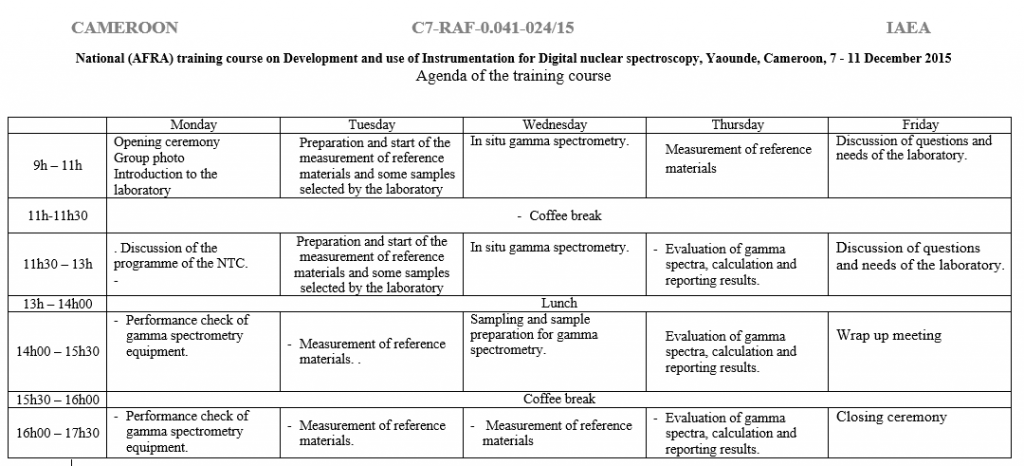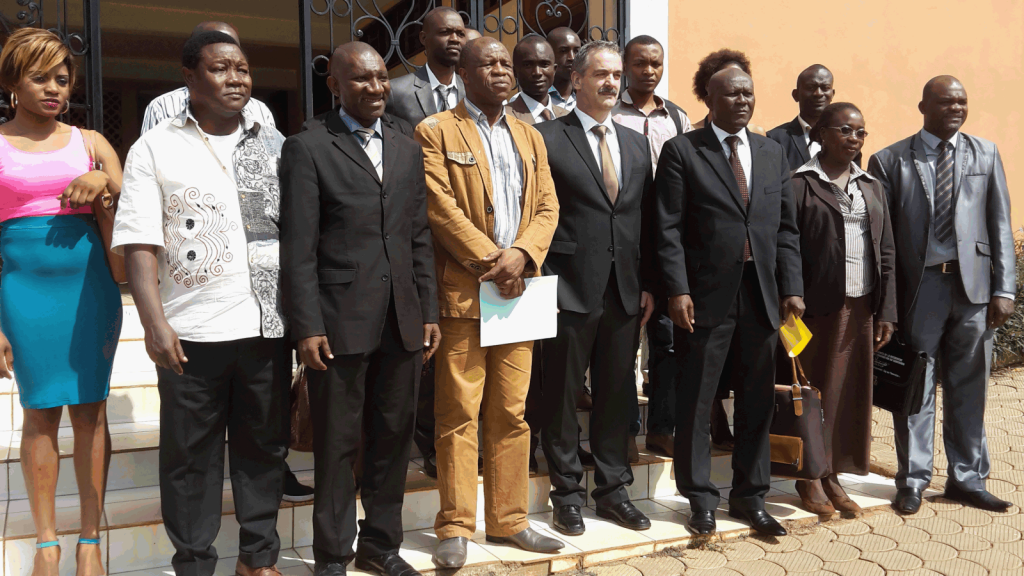National (AFRA) training course on Development and use of Instrumentation for Digital nuclear spectroscopy

International Atomic Energy Agency
Technical Cooperation Project
RAF/0/041: Sharing Best Practices in Preventive Maintenance of Nuclear Equipment (AFRA)
PROSPECTUS
C7-RAF-0.041-024
| Title: | National (AFRA) training course on Development and use of Instrumentation for Digital nuclear spectroscopy
|
| Place: | Yaoundé, Cameroon
|
| Date: | 07-11 December 2015
|
| Deadline for nominations: | 20 August 2015 |
| Organizers: | The International Atomic Energy Agency in collaboration with the Government of Cameroon, Through The Department of Physics, Faculty of Science of the University of Yaoundé I and National Advanced School of Engineering (CETIC). |
| Language: | The language of instruction will be French. |
| Participation: | The training course is open to 25 Participants. |
| Target Participants: | Professionals, Researchers, working with radiation detectors and Technicians in charge of maintenance and repair of radiation detectors and monitoring instrumentations |
| Purpose of the
course:
|
Digital pulse processing (DPP) has become a key technique for processing pulses from radiation detectors. The technique is utilized in many research and commercial instruments, particularly Multi channel Analyzers and related spectroscopy systems like: Canberra – Lynx Digital Signal Analyzer, OSPREY Universal Digital MCA, DSA-1000 Desktop Spectrum Analyzer, InSpector 2000 DSP Portable Spectroscopy Workstation; Ortec – digiBASE Digital Gamma Spectrometer, DSPEC spectrometer, DigiDART Portable Digital HPGe MCA etc.
Although, the technique has proliferated very quickly the training on underlying basic principles and their implementation has been slow and inadequate, even in developed countries, due to proprietary hardware and software, lack of specialized text books, training procedures and educational hardware platforms. The aim of this course is to train the participants in underlying principles, and their implementation through a step by step development of a custom made Multichannel Analyzer by using state of the art development tools like MATLAB/Simulink, Xilinx ISE and a FPGA based hardware |
|
Participants’ qualifications and experience:
|
The participants should be experienced technicians, engineers, physicists or have a degree in a related area and be involved in a refurbishment and development of modern nuclear spectroscopic systems that requires utilization of digital signal processing and particularly Digital Multichannel Analyzers. A basic knowledge in microcontroller, C programming and FPGA programming is required. |
|
Nature of the course:
|
The training will consist of lectures in the form of technical presentations by the expert followed by practical demonstrations with hands-on exercises. The following topics will be covered
|
| Course
Director: |
Mr Patrice Ele Abiama
Ministère de la Recherche Scientifique et de l’Innovation Institut de Recherches Géologiques et Minières;
|
|
Additional requirements: |
The Course Director will be informed in due course of the names of the selected candidates and will at that time be given full details on the procedures to be followed with regard to administrative matters.
|
| Administrative
and financial arrangements: |
The organizers of the course do not accept liability for the payment of any cost or compensation that may arise from damage to or loss of personal property, or from illness, injury, disability or death of a participant while he/she is travelling to and from or attending the course, and it is clearly understood that each Government, in nominating participants, undertakes responsibility for such coverage. Governments would be well advised to take out insurance against these risks |
Information Sheet_RAF0041Yaounde Cameroon


